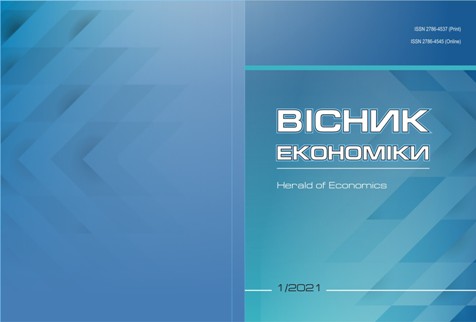Accounting in the new generation society and Industry 5.0
DOI:
https://doi.org/10.35774/visnyk2024.02.177Keywords:
accounting, fifth industrial revolution, Industry 5.0, post-information society, innovation, digital economyAbstract
Introduction. The latest stage in the development of social formations is the formation of Industry 5.0. An important component of the modern industrial and technological system is the post-information society, in which not only the content of information is important, but also the methods of its processing, interpretation, transmission and use for management decisions by various internal and external stakeholders. The demand for accounting as an information component of Industry 5.0, which prepares and optimizes economic information according to the information priorities of users, is substantiated.
The purpose of the articleis to substantiate the importance of accounting in the post- information society and to adapt its theory and practice to the identifying characteristics of Industry 5.0.
Methods. In the process of researching the perspectives of the transformation of accounting in the conditions of Industry 5.0, general scientific empirical, logical and historical methods of knowledge of reality were used. Research is based on general methods of studying economic processes, facts and phenomena from the standpoint of accounting and computer technology. The information base of the research is normative and legal documents on the regulation of accounting, scientific works of domestic and foreign scientists in the field of digitization of accounting in the post-information society, etc. Results. A comparison of Industry 5.0 with the previous stages of the industrial and technological development of society was made. The impact of technological and socio-economic development of modern society on accounting is explained. Ten key characteristics of Industry 5.0 in the context of the transformation of accounting theory, methodology, organization and practice are identified: intelligent governance and self- management, decentralization, enterprise security, human-centeredness and the value of human capital, sustainable development of small and medium-sized enterprises, total innovation and Deep Tech, sustainability ecosystems, circular economy, social orientation, ESG reporting. The main advantages of the development of the concept of Industry 5.0 in terms of the development of accounting are: intensification of the economy; personal growth; decentralization of management and self-regulation; provision of urban comfort; quality receipt of administrative services; environmental, social protection and cyber-military security of citizens.
Perspectives. The systematization of the key features of Industry 5.0 made it possible to identify their common characteristic, which consists in the possibility of free scaling of accounting information to the macro level, which positions accounting as an information intermediary between enterprises and economic sectors or territorial associations. Therefore, promising directions for further research are the development of methods of transformation of accounting in the context of various branches of the economy in the conditions of the formation of Industry 5.0.
References
Kraus, K., Kraus, N. and Shtepa, O. (2021). Industriia kh.0 i industriia 4.0 v umovakh tsyfrovoi transformatsii ta innovatsiinoi stratehii rozvytku natsionalnoi ekonomiky[Industry x.0 and industry 4.0 in the conditions of digital transformation and innovative strategy of the development of national economy]. Efektyvna ekonomika – Efficient economy, 5. Retrived from http://www.economy.nayka.com. ua/?op=1&z=8901. DOI: 10.32702/2307-2105-2021.5.91.[in Ukrainian].
Industry 5.0 Market Size, Share, Trends & Industry Analysis by Technology (Digital Twin, Al in Manufacturing, Industrial Sensors, Augmented & Virtual Reality, Industrial 3D Printing, Robotics), Sustainability (Waste-to-Energy Conversion, Recycle, Material), Industry - Global Forecast to 2029. (2023). 229 p. Retrived from https:// www.marketsandmarkets.com/Market-Reports/industry-5-market-35376359.html.[in English].
Arcot, Saradha. (2023). Industry 5.0 and Society 5.0. Industrial Revolution and Metaverse: Industry 5.0. Retrived from http://doi.org/10.54368/qpbc.2023.1.1.[in English].
Madhavan, Meena, Sharafuddin, Mohammed Ali, Wangtueai, Sutee. (2024). Measuring the Industry 5.0-Readiness Level of SMEs Using Industry 1.0–5.0 Practices: The Case of the Seafood Processing Industry. Sustainability, 16, 2205. Retrived from http://doi. org/10.3390/su16052205.[in English].
Tunji-Olayeni, Patience, Aigbavboa, Clinton, Oke, Ayodeji, Chukwu, Nissi. (2023). Research trends in industry 5.0 and its application in the construction industry. Technological Sustainability, 3, 1-23. Retrived from http://doi.org/10.1108/ TECHS-07-2023-0029.[in English].
Dollija, Elda, Gura, Kriselda. (2024). The Role of Humans as Key Enablers of Industry
0. Constraints and Opportunities in Shaping the Future: New Approaches to Economics and Policy Making, 39-55. Retrived from http://doi.org/10.1007/978-3-031- 47925-0_5.[in English].
Abouhawwash, Mohamed, Rosak-Szyrocka, Joanna, Gupta, Dr-Shashi. (2024). Aspects of Quality Management in Value Creating in the Industry 5.0 Way. RC. ISBN: 9781032677019.[in English].
Vijayakumar, P., Kumar, S., Navaneeth, B., Anand, R. (2024). Industrial Revolution (Industry 5.0) and Artificial Intelligence Technology. Using Real-Time Data and AI for Thrust Manufacturing, 169-192. Retrived from http://doi.org/10.4018/979-8-3693- 2615-2.ch009.[in English].
Rai, Nimisha, Pandey, Akhilesh. (2024). Marketing Cues in Industry 5.0: Journey to Hyper Personalization. Interantional journal of scientific research in engineering and management, 08, 1-13. Retrived from http://doi.org/10.55041/IJSREM28871.[in English].
Sugiarta, I., Ardina, Cening, Parnata, I., Bagiada, I. (2023). Work Readiness of Accounting Vocational Education Students in Facing the Era of the Industry 4.0 and Society 5.0. International journal of Education, Learning and Development, 11, 1-8. Retrived from http://doi.org/10.37745/ijeld.2013/vol11n918.[in English].
Deswanto, Vero. (2022). Literature Review: Green Accounting Era 4.0 Menuju Society 5.0. Jurnal Riset Akuntansi dan Manajemen Malahayati. Jurnal Riset Akuntansi dan Manajemen Malahayati,11, 42-48. Retrived from http://doi.org/10.33024/jrm. v11i2.7213.[in English].
Tavares, Maria, Azevedo, Graça, Marques, Rui Pedro, Bastos, Maria Anunciação. (2023). Challenges of education in the accounting profession in the Era 5.0: A systematic review. Cogent Business & Management, 10. Retrived from http://doi.org/1 0.1080/23311975.2023.2220198.[in English].
Yusuf, Agus. (2020). Sharia accounting on Indonesian Financial Accounting Standard on zakat and waqf take on industrial revolution 4.0 and society era 5.0. Journal of Islamic Accounting and Finance Research, 2, 229. Retrived from http://doi.org/10.21580/ jiafr.2020.2.2.6295.[in English].
Muravskyi, Volodymyr. Accounting and Cybersecurity: Monograph. Scientific Editor – Z.-M. Zadorozhnyi. Kindle Publishing, KDP, Seattle. USA. 2021. 200 p.[in English].
Zadorozhnyi, Z.-M., Muravskiy, V., Shevchuk, O., & Bryk, M. (2021). Innovative Accounting Methodology of Ensuring the Interaction of Economic and Cybersecurity of Enterprises. Marketing and Management of Innovations, 4, 36-46. Retrived from http://doi.org/10.21272/mmi.2021.4-03.[in English].
Zadorozhnyj Z. V., Averkyn Ja. F. (2019) Upravlins′kyj oblik: osoblyvosti ta pryncypy [Management accounting: features and principles]. Finansovo-kredytna dijal′nist′: problemy teorii′ ta praktyky – Financial and credit activity: problems of theory and practice, 1, 114–120. Retrived from https://doi.org/10.18371/fcaptp.v1i28.163931 [in Ukrainian].



